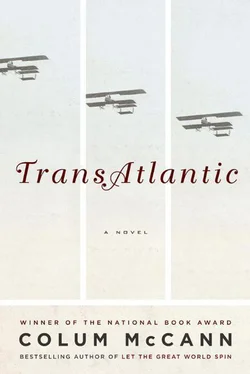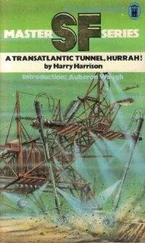When he hits the oar against the water, the light jumps and swerves and shifts, then settles down once more.
EARLY ON SATURDAY morning she wakes Ambrose for the hunt. The night is pitch-black outside. The cold stuns her cheekbones. She has prepared his clothes already. A warm undershirt and long johns. A heavy tweed jacket. Two pairs of socks. Folded on the small wooden chair. His toothbrush laid out, but no razor. It is the one day of the year when Ambrose does not shave early.
A sweep of headlights over the ceiling. The other guests coming down the laneway. Three, four, five of them this morning. The squelch of their tires in the mud. Lawrence’s voice already among them. A whisper and a shushing of the dogs. The drift of cigarette smoke from outside.
In the kitchen she and Hannah ready breakfast: just toast and tea, no time for a fry. The men are dark-eyed, gruff, weary. They glance out the window at the early dark. Fixing batteries in their torches. Checking cartridges. Tightening their laces.
His silhouette shows sudden in the hallway. She is quite sure, at first, that Tomas has been up all night. It has happened before. He has often spent the whole evening out on the water with his star charts. He slouches his way through the kitchen, nods to the men at the table, sits down next to Ambrose. The ritual acknowledgments. They eat breakfast together and then Tomas rises with Lawrence — not a word between them — and together they go to the pantry where the bolted silver safe is kept.
Lottie watches as the bare bulb throws a globe of light down upon them. Lawrence spins the dial on the safe, reaches in, turns to Tomas. She watches her grandson hold the unfamiliar weight in his hand. Bits and pieces of the language floating towards her: twelve-gauge, five-shot, 36-gram load.
— You’ll be going out then? says Hannah.
An astonishing calm in Hannah’s voice, but her body betrays her: the shoulders tight, her neck cords shining, her eyes a premonition of ill fate. She flicks a look at Lawrence. He shrugs, taps at the pipe in his breast pocket, as if that is the thing that will monitor everything.
— Thought I’d give it a go, says Tomas.
— Better have your woolies on.
The kitchen awhirl now. The rumor of dawn. The guests step outside. Tomas leans down to tighten his hiking boots. Hannah takes Lawrence by the collar, whispers something urgent in his ear. Lottie, too, takes Ambrose aside, beseeches him to look after the boy.
— We’ll be back by noon.
She is still in her dressing gown as she watches them go. A regiment. The marks of their bootprints in the mud. The dogs loping patiently behind them. They disappear around the red gatepost and the sky rises up as they grow small.
THE MORNING SOUNDS loud with the retort of the guns. Double blasts. Each one a sharp kick inside her. Lottie finds herself entirely on edge. Just to walk around the kitchen needs the utmost control. She would love to wipe her hands clean of flour and step out the half-door, hurry along the laneway, down to the lakeshore, check on them, watch them, bring them sandwiches, milk, a flask. Her eyes can find no resting place. With each shot she looks out the window. A blankness of gray.
Columns of rain pour distantly over the lake. The branches of the trees knit the wind. Surely, now, the storm will bring them home. She turns to the radio for the ease of noise. Bombs doing what bombs will. She searches the dial and settles on a classical station. On the hour mark even that, too, is interrupted. An incendiary device in Newry. Three dead, twelve wounded. No warning.
She watches the shape of her daughter move from table to stove to pantry to fridge. Hannah fakes unconcern. She kneads the dough and allows the bread to rise. As if the heat from the oven itself might push forward the hands of the clock on the stove. An occasional chatter between them. Did Ambrose have a proper belt? Was Tomas given the thickest of socks? Would Lawrence be alongside them both? Did everyone take an oilskin? When was the last time they shot a scaup? Did he bring his eyeglasses? Has he ever even pulled a trigger before?
IT IS LATE lunchtime before they hear the bark of a dog. The men come down the road as routinely as one might expect: Ambrose and Tomas bringing up the rear, the width of the grassy median between them. Their jackets dark with rain. Shotguns slung over their shoulders. A hint of fatigue in the walk.
She greets them at the front of the cottage, opens the latch on the half-door, beckons them in.
Tomas shucks his jacket and hangs it on the fire irons, bangs his heels on the floor until his boots come off, pulls his wadded socks from his toes, puts them down by the fire. He sits, long and languid, in the chair, hides himself under a towel. A warm smoke rising from his boots and socks.
— What about ye, Nana?
She stands close to the fire, her back against the mantelpiece. She will hold the moment for a long time, the sight of him in the chair, a small crease of light from the fire flickering at the end of his raindark boots.
— Did you like it, then?
— Oh, aye, I suppose.
— Get anything?
— Granddad bagged himself a couple.
There are times — months later, years later, a decade later even — that it strikes Lottie how very odd it is to be abandoned by language, how the future demands what should have been asked in the past, how words can escape us with such ease, and we are left, then, only with the pursuit. She will spend so much of her time wondering why she did not sit down with Tomas and inquire what exactly it was that brought him out the road in the morning, what guided him along the shore, what strange compulsion led him towards the hunt? What was it like, to walk down by the lakeside and crouch in the grass and wait for the birds and the dogs to disturb the blue and the gray? What words went between him and Ambrose, what silence? What sounds did he hear across the water? Which of the dogs hunkered next to him, waiting? How was it that he had changed his mind so simply? She wished, then, that she had carved open whatever idea had crossed his mind in the early hours that one September morning. Was it just one of those random things, slipshod, unasked for, another element in the grand disorder of things? Perhaps he did not want to see his grandfather stepping out alone. Or he overheard his mother talking of the hunt. Or maybe how his stepfather wanted so badly for him to join. Or perhaps it was just pure boredom.
She would find herself wondering — stuck at a traffic light on the Malone Road, or in the butcher shop on the Ormeau Road, or in the peace group on the Andersonstown Road, or in the shadows of Sandy Row, or at the marches where they carried pictures of their loved ones, or the days she found herself outside Stormont awaiting any news of decency, or strolling the rim of the island, or at the back court of the tennis club in Stranmillis, or simply just walking down the stairs with Ambrose, adding day to day, hour to hour — what it was that brought Tomas to the moment, how it became part of the constant unfolding, what was it that changed his mind.
She never asked. Instead, she watched Tomas lift the towel — scuffing it through his hair — and she returned, then, to the kitchen, lit the flame under the stove, the whole of a happiness moving over her.
YELLOW LEAVES LIE in scattered profusion on the green lawn. The cottage has been touched by the edge of a decaying storm. These are the weekends she likes the most: they drive out from Belfast, down the laneway, pause a moment by the gate, the high-voltage wires singing at the end of the country road.
They park down by the barn, on the high side of the driveway where the ground stands firmer, and they use the leaves for grip as they make their way to the half-door.
Читать дальше












